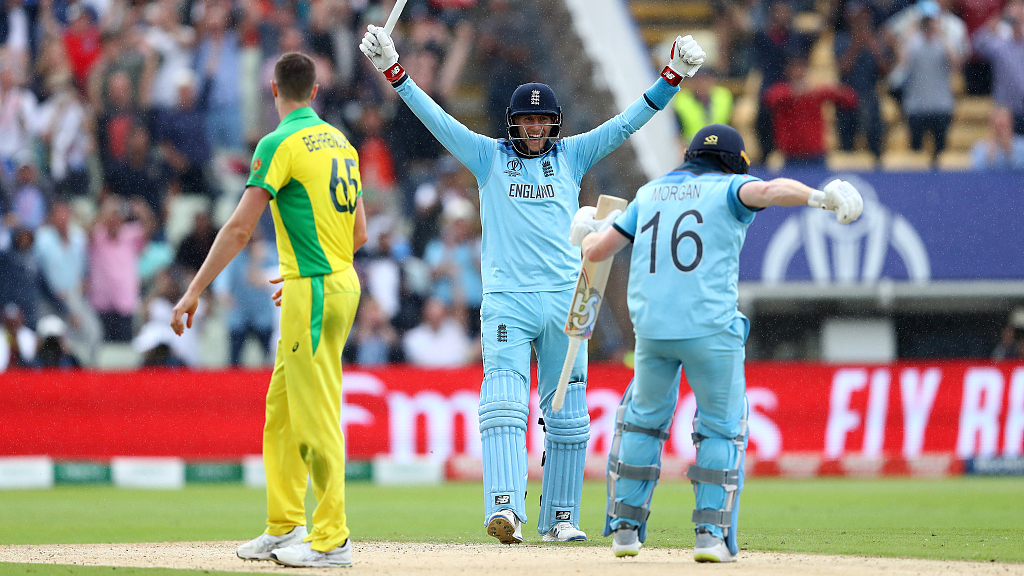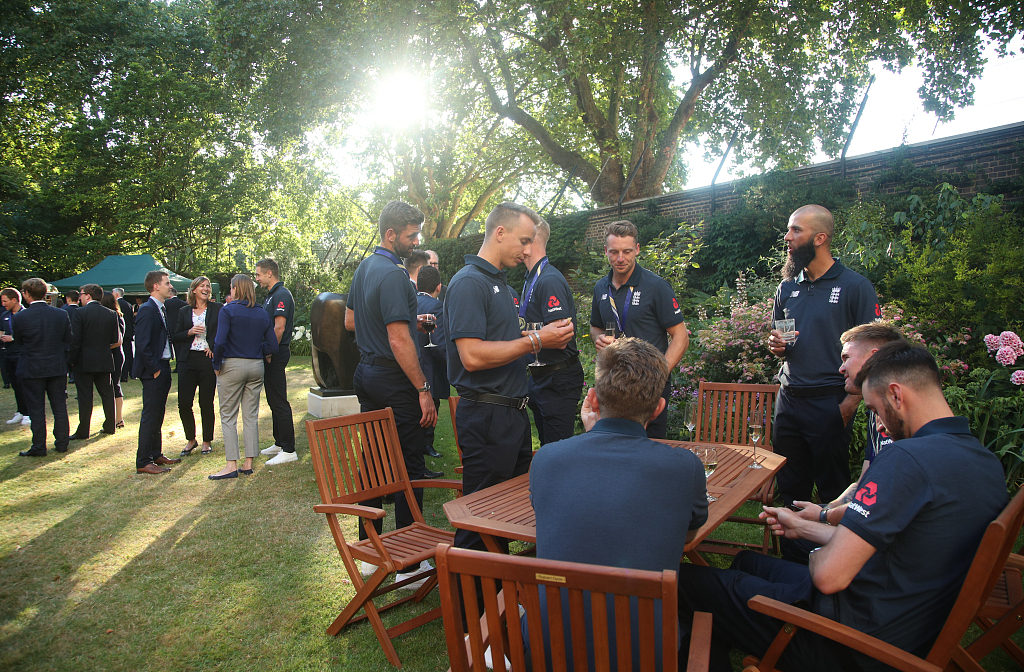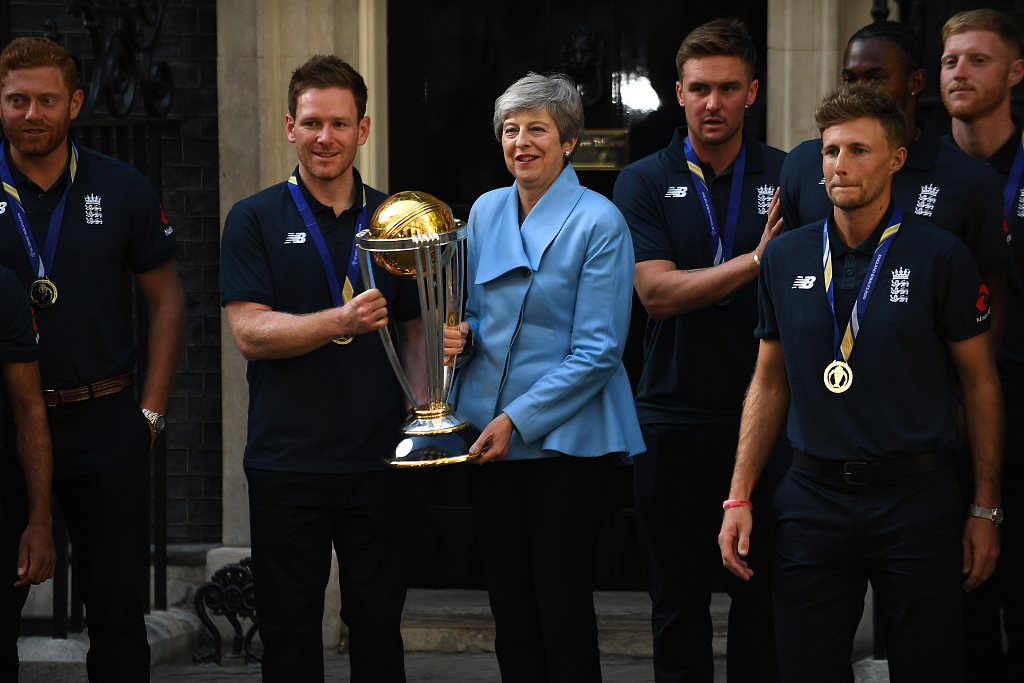

Joe Root of England celebrates as Eoin Morgan of England scores the winning runs to secure victory and send England to the final during the Semi-Final match of the ICC Cricket World Cup 2019. /VCG Photo
England immigrants win world cup
On Sunday, arguably the greatest 50-overs-a-side cricket match in its history saw England, the inventors of the gentlemen’s game, win their first-ever men’s World Cup title at the home of world cricket, Lord’s.
The hosts were declared champions on the basis of hitting more boundaries than their rivals New Zealand in the game that saw both the sides fail to break the deadlock in the stipulated 50 overs and the subsequent super over.
However, the English side’s much-awaited emphatic triumph that saw them breaking the 44-year-long jinx of not winning the coveted cricket silverware in the past, also came as an eye-opener ahead of the much-debated, deliberated and delayed Brexit.
British MP’s caustic Brexit jibe after win
More so, after a caustic tweet by Conservative Party leader and a British parliamentarian Jacob Rees-Mogg, who sparked a massive row for doltishly trolling the European Union (EU) on the Brexit following England’s thrilling World Cup final win. The British politician, who is also serving as Chairman of the European Research Group (ERG) since last year, wrote on the social media networking site, “A d..n close run thing, we clearly don’t need Europe to win”
The churlish tweet immediately drew sharp reactions from various quarters on social media and outside the virtual world as well. Irish Senator Neale Richmond, who is a spokesman on EU affairs and Chair of the Brexit Committee, immediately replied to his British counterpart on the micro-blogging site, “Your captain is Irish…”
Rees-Mogg’s party colleague and Conservative MP, Ed Vaizey, however, clarified to his fellow parliamentarian, “Slightly misjudging the mood there, @Jacob_Rees_Mogg. But while you’re on, the English captain is Irish.”

The England Cricket Team including Jos Buttler, Moeen Ali and Liam Plunkett attend a reception at Downing Street after winning the Cricket World Cup on July 15, 2019 in London, England. /VCG Photo
A Cup-winning squad of immigrants
Dublin-born Eoin Morgan played for Ireland in the 2007 World Cup before putting on the Test cap for England. When the three-time former finalists clinched the nerve-jangling final at Lord’s, it was the captain Morgan, who was called by the tournament organizers to lift the trophy first for leading the champion side.
Morgan’s fellow Irish compatriot and the current Taoiseach (Prime Minister) of the country Leo Varadkar congratulated him on Twitter posting, “It’s a wonderful feeling to see an Irishman and Dubliner Eoin Morgan lifting the Cricket World Cup. A proud day for all of us. Congratulations Eoin Morgan and England. Our debut test encounter awaits.”
Interestingly, not just Morgan, his World champion side has got four other players who were born outside the UK. Opening batsman Jason Roy, who played a pivotal role in giving his side solid starts in a number of matches in the 10-national tournament, is a South African and was born in Durban. His family migrated from South Africa to England when he was 10. Roy’s teammate and all-rounder Tom Curran, whose father Kevin played for Zimbabwe in the 1983 and 1987 World Cup, is also a South African. More significantly, Ben Stokes, who played a stellar innings in the final to guide England to their colossal triumph, was born in Christchurch, New Zealand before relocating to England at the age of 12 while another match-winner of the nerve-jangling final, Jofra Archer was born in Barbados and qualified to play for England after being granted the UK citizenship only two months ago. The talismanic Bridgetown-born young pacer, who bowled the memorable super over to restrict the Kiwi batsmen in the final, was not even in England’s preliminary squad and qualified to play for England after England & Wales Cricket Board (ECB) changed the residency requirements at the last moment to pave his way into the World Cup-bound team.
Apart from the five foreign-born cricketers, Morgan’s multi-ethnic, multiracial side also got two Pakistani-origin cricketers in their ranks. Prolific all-rounder Moeen Ali and leading spinner Adil Rashid were born on English soil but both of them were grandchildren of Pakistani migrants.

Eoin Morgan and the England Cricket Team pose with Theresa May and the Cricket World Cup at Downing Street, London on July 15, 2019. /VCG Photo
Brexit-linked tweet faces backlash
No wonder, Daniel Lawes of the Youth Politics UK activist group wrote in his befitting rebuttal to Rees-Mogg, “Captained by an immigrant, fastest bowler an immigrant, leading all-rounder an immigrant, main spinner son of an immigrant.”
Meanwhile, British writer and strategist, Alastair Campbell, who is best known for his role as former British Prime Minister Tony Blair’s spokesman, suggested, “perhaps instead of making a silly Brextremist point, offer congratulations to the Irish captain, the NZ-born man of the match, and the Barbadian bowler who got it over the line.”
Trolling Rees-Mogg, Catherine Kavanagh quipped, “Except for the Freedom of Movement and Common Travel Area as underpinned by the EU which gives your Irish captain the right to live work and travel in England.”
More interestingly, England’s head coach Trevor Bayliss is an Australian and has played a key role in helping England bring the Cup home. England’s previous Director of Cricket was former Test stalwart Andrew Strauss, who was a South African by birth.
“Tebbit test” & anti-immigration baggage of past
Although the impending Brexit has brought the immigration issue to the forefront once again, but way back in 1990, the then Conservative MP Norman Tebbit controversially coined the term “cricket test” as an idea that the children of Caribbean and South Asian immigrants were not adequately British if they supported the countries of their heritage, rather than England, in cricket matches. Although the bizarre “Tebbit test” didn’t hold any solid ground in a multicultural British society but its shadows has been sporadically hanging over the world of sport for some time.
In fact, the strong anti-immigration stands by a section of the British society that fueled the Brexit referendum, compelled London’s Migration Museum share a powerful reminder about the role of immigrants in the England football squad by releasing a poster with an alternative starting line-up ahead of England’s 2018 FIFA World Cup opening game against Tunisia on June 18 last year. The poster, titled as “England without immigration,” removed any players that started that game who wouldn’t have been there without the impact of first-and-second-generation immigrants. Surprisingly, just five players remained in that line-up who were not having any immigrant lineage. Goalkeeper Jordan Pickford, Jordan Henderson, Kieran Trippier, Harry Maguire and John Stones were the remaining five without carrying any colonial immigration baggage.
Not just England, 87% of the 2018 FIFA World Cup-winning French national football team was comprised of either direct or indirect immigrants, with a total of 20 players in their 23-member squad being immigrants. Among their World Cup heroes only Florian Thauvin, Raphael Varane and Benjamin Pavard were entirely of French origin.
As per a FIFA report, roughly 10% of all the players at the 2018 FIFA World Cup who were born outside of the country they played for. Although the percentage was quite low in the ICC Cricket World Cup this year with the Asian sub-continent sides predominantly having almost negligible immigrations in their own territories and thus, in their cricket squads, but countries like England, Australia, New Zealand and South Africa have traditionally and regularly been including immigrants to their respective ranks.
Now, with the gloomy Brexit clouds hovering over the English sky and the dilemma over deal or no deal making the typically overcast British conditions more despondent, the men’s cricket team’s victory has certainly added a silver lining to the complex situation.

Copyright © 2018 CGTN. Beijing ICP prepared NO.16065310-3
Copyright © 2018 CGTN. Beijing ICP prepared NO.16065310-3